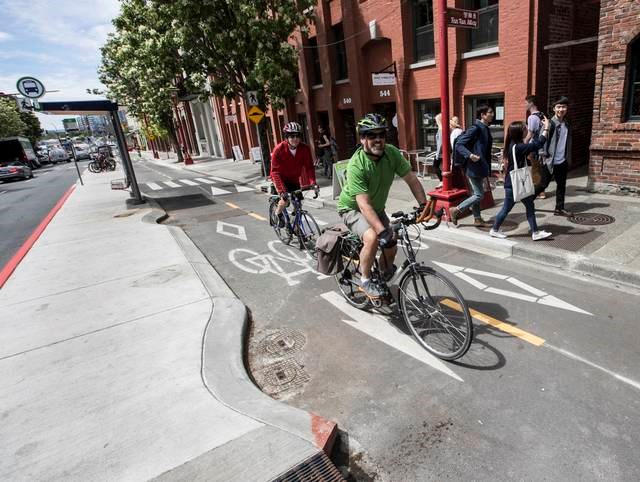A human rights tribunal hearing started Monday to determine whether the City of Victoria and B.C. Transit have discriminated against blind pedestrians by moving some bus stops away from the curb to accommodate bike lanes.
The human rights complaint claims the city and transit agency are discriminating against people with impaired vision because five bus stops on Pandora between Cook and Store streets were moved from the curb to an island that is separated from the sidewalk by a two-way protected bike lane. Pedestrians have to cross the bike lanes to reach the “floating” transit stops.
While the city is responsible for the street’s design, the complaint argues B.C. Transit is failing to provide safe public bus service to people who are blind, because it doesn’t provide assistance to safely cross the bike lanes.
Oriano Belusic, who is named as a complainant on behalf of the Canadian Federation of the Blind, likened crossing the bike lanes to “playing Russian roulette.”
He said he’s had a close call with a cyclist and knows of many more, including incidents in which blind pedestrians’ canes have been “mangled” by bikes.
“Blind people have no way of safely crossing the bike lane. They don’t know when the bikes are coming. They can’t tell when bikes are coming,” he said.
The city maintains that the Pandora Avenue bike lanes, which were installed in 2017, “meet or exceed all applicable design standards and are consistent with best practices for these types of installations around the world,” said spokesman Bill Eisenhauer.
“Road design involves balancing many competing interests to minimize risks to all users. The city is committed to safety and continuous improvement of all our infrastructure. We are always willing to look at the safety of our streets and to take steps to make changes where necessary and appropriate.”
A B.C. Transit spokesperson said by email the agency is aware of the complaint and is co-operating with the proceedings, but cannot comment on the active human rights complaint process.
Both B.C. Transit and the City of Victoria applied to have the complaint dismissed.
The tribunal in May denied an application by B.C. Transit to dismiss the complaint on the grounds that it had no chance of succeeding.
At issue, tribunal member Norman Trerise wrote in the decision, is “whether the Class has experienced an adverse impact from Transit’s service of the Floating Stops.”
He noted that there is a marked crosswalk for pedestrians to cross the bike lanes, and the majority of cyclists slow down significantly for people waiting to cross. However, he wrote, videos show “a substantial minority” of cyclists do not slow down enough before the crosswalk in order to stop for someone to cross.
“It seems unlikely that [a blind person] could reliably determine when it is safe to step into the crosswalk as a cyclist approaches — assuming that they would even know that a cyclist was approaching,” Trerise wrote.
He said the situation effectively prevents access to the bus stops for people who are visually impaired.
“As a result, they are denied bus service along the relevant length of Pandora Street.”
In July, the city attempted to have the complaint dismissed based on Belusic’s refusal of what it called a reasonable settlement offer that detailed its intention to make the crossing safer by adding flashing lights, a pedestrian push button and a flexible post between bike lanes at the crosswalk to slow down cyclists.
Trerise found that the settlement did not meet the tribunal’s requirements because it didn’t include monetary compensation. In denying the application, he wrote the issues raised in the complaint “are, in my view, important to society as a whole.”
The hearing is scheduled to take place over three weeks from now to Aug. 28.
